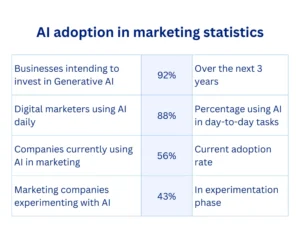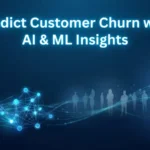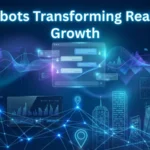Artificial intelligence is undeniably reshaping every industry. However, the industry that has the maximum potential to benefit from AI technology is the marketing industry. Most features of generative AI directly help different marketing processes, resulting in cost and time savings, more effective marketing plans, and flexibility to scale. In this blog, we shall uncover the landscape of AI in marketing industry and how to use it practically for the best results.
What is AI in Marketing?
Artificial intelligence in marketing means using machine learning algorithms and advanced data analytics to automate and optimize marketing processes. This technology allows marketers to make informed, data-based decisions, predict customer behaviour, and offer personalized experiences at scale. AI-powered marketing tools can analyze large amounts of data in real-time, identify patterns and trends that humans might miss. These capabilities of AI tools allow marketers to gain deeper insights into their performance, audience, and campaigns to drive better results.
Use Cases of AI in Marketing
AI has a wide range of applications in the field of marketing. Here are some of the well-known use cases of AI in marketing.
-
Customer Targeting and Segmentation
AI is redefining how marketers approach customer targeting and segmentation. Traditional methods of segmentation would rely on broad demographic categories, which often fail to accurately reflect individual customer preferences. Utilizing Artificial intelligence technology, marketers can create more accurate customer segments based on a wide range of data points. These include behavioural data, purchase history, browsing patterns, and their social media activity. Generative AI models can analyze complex datasets to identify patterns and trends that humans would not be able to detect. Such an advanced customer segmentation allows marketers to create specifically targeted campaigns that are more appealing to specific customer groups.
-
Optimizing Ad Spend and Performance
Another field with an important role of AI in marketing is advertising optimization. AI-powered tools can analyze huge datasets in real-time to identify the most effective ad placements, timing, and creative elements for each campaign. These AI tools can adjust bid strategies, allocate budget to best-performing channels, and generate ad copy variants to improve performance.
-
Streamlining Content Creation and Curation
Content creation is one of the most important aspects of any marketing strategy. Content creation is generally a time-consuming and resource-intensive process. AI changes this by automating many parts of the content creation process, like generating content ideas to writing and optimizing content. Generative AI in marketing can analyze trending topics, competitor content, and user engagement data to suggest relevant content ideas that resonate with your target audience. Many advanced AI tools and large language models are capable of drafting content based on parameters. This content can then be refined by human writers. There are image generators in the market that create prompt-based based realistic images and infographics for use in marketing. Apart from the role of AI in content creation, AI tools also help in content curation by identifying and recommending relevant content from various sources. This feature is particularly helpful in social media marketing, where staying updated with trends and timely content sharing is crucial.
-
AI-powered Customer Service Chatbots
Customer service is an inevitable part of any comprehensive marketing and brand strategy. It is a direct point of contact with your customers and thus has immense potential to help your brand stay ahead of the competitors. AI-powered chatbots are used by many companies for instant, 24/7 assistance to customers across various channels. Utilizing neural networks or large language models, these chatbots can handle a wide range of customer queries, ranging from basic FAQs to complex product recommendations. With an AI model trained on your customer profile data, it can learn and improve with every interaction. Thus, AI-powered chatbots are more effective at offering customer satisfaction.
-
Predictive Analytics
Predictive analytics is the most powerful application of machine learning in marketing. Machine learning models analyze historical data and detect patterns to project future trends. For instance, it can forecast customer churn or customer conversion probability based on demographics. Marketers can apply these predictive capabilities to make informed decisions from product development to campaign strategy. Predictive analytics also helps marketers forecast product demand, optimize pricing strategies, and identify emerging trends proactively. This gives brands a competitive edge over their competitors in the market.
Benefits of Using AI in Marketing
Using AI in marketing brings multiple benefits for the brand or organization. Some of the benefits of using artificial intelligence in marketing are:
-
Efficiency and Productivity
AI use in marketing automates complex processes, helping to save time and resources. This allows the marketing team to focus on more strategic activities like creative thinking and campaign development. AI tools can create multiple variations of an email campaign, automating personalized content generation based on customer data. This is a more effective approach as it delivers a more personalized experience to customers. Such email copies can be rephrased and refined to align with customer preferences, enhancing the productivity of marketing teams.
-
Personalization at Scale
Most marketing professionals today incorporate personalization in their email marketing campaigns. AI-powered marketing tools facilitate offering more personalized experiences for individual customers at scale. Using AI chatbots, marketing teams can collect customer behaviour data and requirements at a much larger scale. These customer preferences, requirements, and behavior patterns are recorded to create highly targeted messages that resonate with individual customers.
-
Data-driven Decision-Making
Generative AI in marketing provides the benefits of advanced data analytics. This supports marketers to make informed decisions about their strategies actively. For example, if you can track the performance of your campaign, you know how long to run it and when to stop, or what to improve. When your decisions are data-backed and not intuitive, they are more likely to drive better results.
-
Improved ROI
AI can facilitate achieving a better return on marketing investment by optimizing ad spend and targeting the right customer segment with personalized messages. This is extremely helpful for startups and small businesses with limited budgets.

The Future of AI in Marketing
The current market size of AI in marketing is $47.32 billion, which is expected to reach $107.5 billion by 2028. AI is getting more advanced and accurate with time, increasing hope for a bright future in marketing. We’ll see more sophisticated use of AI in voice search optimization, influencer marketing, and hyper-personalized customer experience. One more advancement we might experience soon is the use of AI in sentiment analysis. Advanced AI algorithms will be able to analyze sentiments based on facial expressions, voice tone, and physiological responses to determine emotional state. This will facilitate connecting with target customers on an emotional basis for marketers. Another emerging trend to watch is the integration of AI with other technologies like blockchain and IoT (Internet of Things). These integrations can lead to new advancements in areas like real-time marketing based on IoT device data.
Roadmap to an Effective AI Adoption
It is important to plan strategically before adopting AI in the workplace. Here’s a roadmap to refer to for an effective AI adoption.
-
Conduct a requirement assessment
For an effective adoption of AI in marketing, it is important to conduct an assessment of your needs. Consider the entire organization’s requirements and problems. Understand the scope of AI in your business, what problems it will solve, and how it can help. Define clear goals for this AI adoption project.
-
Select the right AI tools and platforms
There are hundreds of AI tools and platforms in the market. Depending on your requirements and resources, choose the one that fits you. Make an informed decision after consulting with AI experts. You can consult with a trusted AI development company for guidance.
-
Train and upskill your team
It is important to train your team for this technological shift. Address their queries, inform them, and prepare them for upcoming changes in the workflow. Conduct training sessions to upskill your team.
-
Implement and test
Once your AI tool is ready, test it rigorously to identify any problems that might need attention. In the testing phase, be observant and understand if this tool aligns with your vision. Implement it in your workflow and grow.
-
Interate and Scale
After a pilot project, you can refine and improve your AI tool over time. This will enhance your efficiency. Once a project is successful, you can scale it further.
Conclusion
In the past few years, more and more businesses have realized the importance of AI adoption in their workplace. With further advancements, the number of businesses using AI will also grow. Marketing is an industry that is undergoing major changes due to artificial intelligence technology. AI tools are being used in almost every marketing operation nowadays. AI enhances overall efficiency, productivity, and marketing ROI and reduces cost, time, and resources spent. You can create a custom AI tool with the help of a trusted AI development company. AnavClouds Analytics.ai is one such company with experience in deploying AI in businesses across several industries. Our AI experts will create a tailor-made AI tool that meets your specific requirements.
FAQs
What is the best example of AI in marketing?
One of the best examples of AI in marketing is Nike using emotional depth added with technology for their marketing strategy. Emotions and AI technology work wonders together for customers.
Is 90% of AI marketing?
There is no exact percentage of AI features designed for marketing. AI is a group of intelligent technologies that can be customized to suit different operations across industries. However, AI is indeed very useful in the marketing sector, more than any other process.
What is the future of AI in marketing?
Advanced predictive analysis capabilities and sentiment analysis will shape the future of AI in marketing. With increasing AI adoption, we might unlock new possibilities in marketing.
What is AI marketing called?
Artificial intelligence uses sophisticated algorithms in the marketing field. Thus, AI-powered marketing is also called Algorithmic marketing.
Is marketing in danger from AI?
No, even though most marketing processes can be automated using AI, a human collaboration keeps it in check and guides AI tools to perform better.



